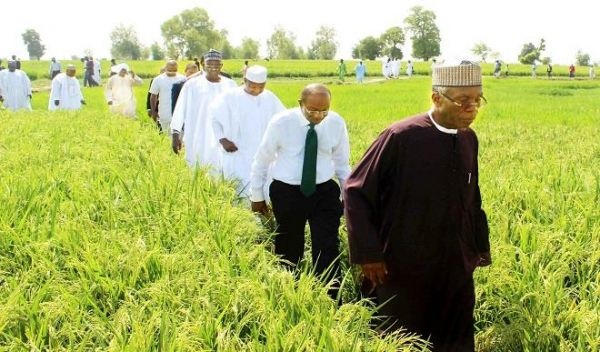The recent submission of the Nigeria Sovereign Investment Authority (NSIA) that its investment in promoting local farming is yielding results because its production of made-in-Nigeria fertiliser has risen to 2.22 million metric tones, has raised an issue of cross examination.
Business Hilights recalls that sometime last year, a delegation of top ministry officials led by the Minister of Agriculture, Chief Audu Ogbeh went to Morocco to seal a fertilizer producing partnership deal, up till this moment, nothing had been heard about that trip or on its advantage.
It was not clear whether the trip was an official jamboree or real drive to deepen agro-driven diversification of the ailing economy.
It is on record that Morocco remains Africa’s leaders in fertiliser production, but what has come of the delegation remains a mirage to watchers.
Since the last three years, the current administration had been hammering on revamping local rice production sub sector and several states had been keying into the Central Bank of Nigeria’s (CBN) Anchor Borrowers Programme (ABP), but still yet, little or no Nigerian market can be said to be saturated with local rice even as foreign smuggled rice remain the most visible across every nook and cranny of the country.
Whereas some farmers say they are finding hard to access the CBN’s facilities to grow rice in commercial quantity, others say fertilizer racketeering is their major challenge.
The Managing Director of NSIA, Mr. Uche Orji, in an interview with a news agency in Abuja, said NSIA’s investment was to make fertiliser affordable all year round to farmers, but the question is if a mere 2.22mmt can really take Nigeria’s economic diversification via agriculture to the desired height”.
He said “Prior to December 2016, Nigeria’s stock of blended fertiliser was shipped into the country as fully finished products, even though urea and limestone, which constitute roughly two-thirds of the components of each bag are available locally.
“Knowing this, President Muhammadu Buhari approved a Presidential Fertiliser Initiative (PFI) for the local production of blended NPK 20:20:10 fertiliser.
“The objective of the project is to deliver commercially significant quantities of affordable and consistently high-quality fertiliser at the right price and in time to Nigeria’s over 500,000 farmers across the country. The target retail price regime at the time was between 50 per cent and 65 per cent of the prevailing market price,’’ he said.
Orji said that after one year of running the programme, NSIA noted that import of finished fertiliser had reduced drastically.
Though he claimed that “For the 2017 wet season, it is estimated that about N60 billion from the 2017 budgetary provisions for fertiliser was saved, while another saving of $150 million was conserved from the foreign exchange window,” findings from farmers across the states show that the product was still a scarce commodity.
However, Orji sounded upbeat that “To date, the programme has contributed to the resuscitation of 14 moribund blending plants, which represents 55 per cent of total installed capacity in Nigeria. Also, more than six million bags of 50kg NPK 20:10:10 fertiliser have been produced locally, which have been distributed to farmers”.
“The success of the Presidential Fertiliser Initiative (PFI) is evidence enough that Nigeria can sustainably produce fertilisers locally at a reasonable price without subsidy. With the right model, any constraint can be addressed,’’ he said.
However, the PFI is an initiative of President Muhammadu Buhari, borne out of desire to end fertiliser importation and the attendant impact on the country’s foreign exchange reserves. It was designed to stimulate significant economic activities across the agriculture value chain and catalyse growth by meeting the fertiliser demand of farmers during the wet farming season.
Ahead of the 2017 farming season, Buhari inaugurated a special committee to look into and bridge the gaps in the production and distribution of fertiliser in Nigeria. It was this drive that necessitated the Morocco trip which observers are yet to see any meaningful result so far.









